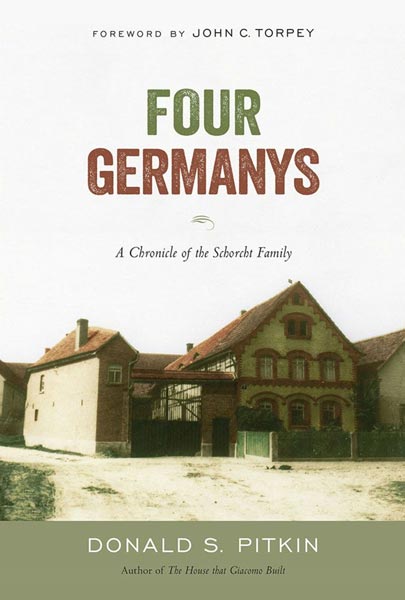 Four Germanys Four Germanys
A Chronicle of the Schorcht Family
Donald S. Pitkin
Narrated by Kevin Meyer
Available from Audible
Book published by Temple University Press
In this book by Donald Pitkin, author of The House that Giacomo Built, comes a story of the Schorcht family, through whose fortunes and struggles one can see the transformations of Germany through the long twentieth century.
Each chapter of Four Germanys is reflective of generational rather than historical time. In 1922, Edwin Schorcht inherited his family farm, and in Part One, Pitkin traces the derivation of this farmstead. Part Two focuses on Schorcht's children who came of age in Hitler's Germany. Part Three has the Schorchts growing up in the Ulbricht years (1950-73) of the German Democratic Republic. The book concludes with the great-granddaughter, Maria, looking back to the past in relation to the new Germany that history had bequeathed her.
Ultimately, Four Germanys reflects the impact of critical historical events on ordinary East Germans while it also reveals how one particular family managed its own historical adaptation to these events.
Donald S. Pitkin was Professor Emeritus of Anthropology at Amherst College and Founder of the Anthro-Sociology Department. He was the author of The House that Giacomo Built: History of an Italian Family, 1898-1978.�
REVIEWS:
“Four Germanys is a real page-turner. Pitkin presents the social transformation of what is now eastern Germany through several major regime changes. He offers a masterful blend of oral history, secondary history, and archival data analysis that illuminates the relationship between local and macro-events. Pitkin's balanced ethnographic account of the County of Weimar, home to the Schorcht family, is a revealing examination of the texture of rural life outside the urban centers. This is an important case study.”
—Jane Schneider, Professor Emerita of Anthropology at the Graduate Center, City University of New York “With his quotidian focus, Pitkin draws out rich details as he relates small-scale personal events to a larger historical canvas to take the reader through Germany's Nazi, Communist, and unified capitalist periods. A very readable, insightful examination of how people in rural East Germany lived through decades of dramatic change, Four Germanys offers a very fresh and welcome perspective to readers interested in the social and political transformations of Europe in the twentieth century.”
—David Kertzer, Dupee University Professor of Social Science and Professor of Anthropology and Italian Studies at Brown University
|

